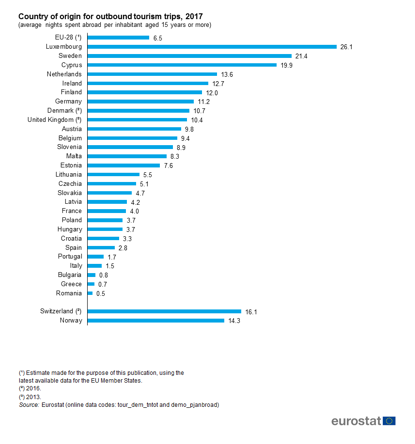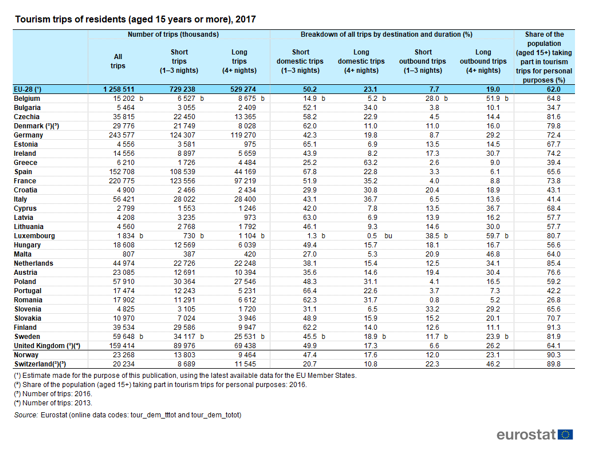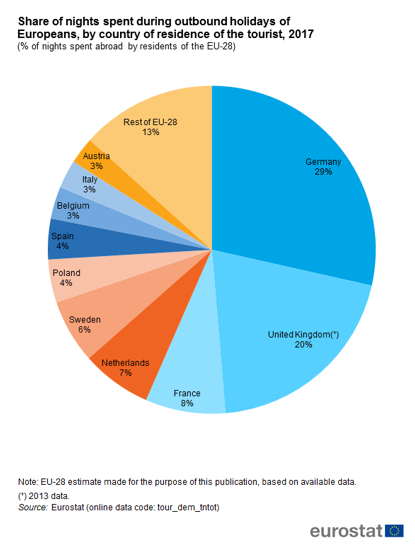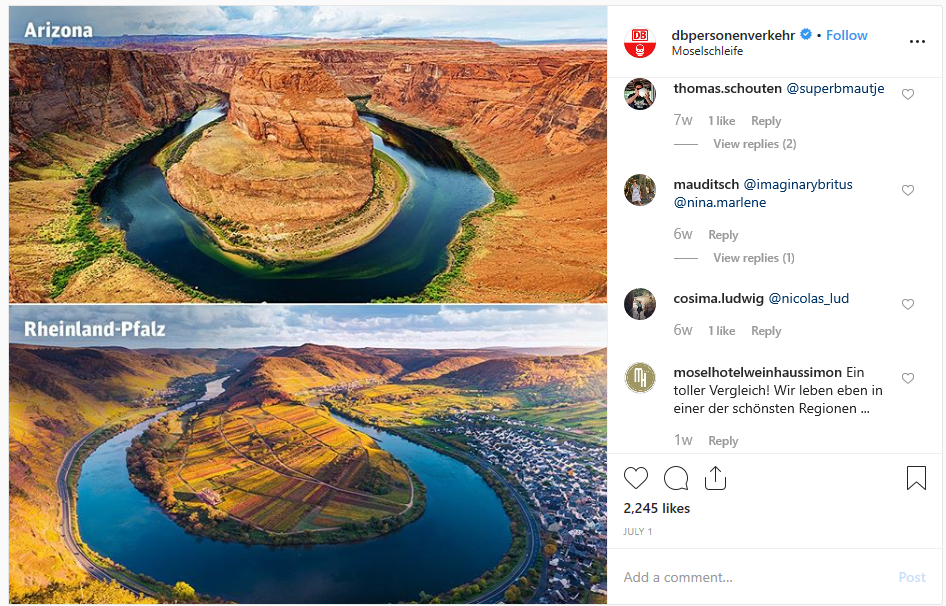Case study: How Germany promoted domestic travel by using data and technology
An extensive read on digital skills for DMO’s.
A common trend with regards to holiday behavior in some NTG partner countries such as Germany, United Kingdom, Ireland and The Netherlands is that people prefer to travel abroad to spend their free time, instead of spending time in their home countries.
For destination management organizations that need to encourage domestic travel, a totally different approach is required that combines creative thinking, digital and sustainable skills. German Rail, the official German railway organization, provides a remarkable example of such an approach.
German Rail launched a very successful digital campaign this summer and in this blog, NTG analyses the steps and learning points from this innovative case.
Relevance of the campaign based on domestic travel
When we look at the statistics available from Eurostat (2017) regarding outbound tourism in Europe, a lot can be learned. The average number of nights spent abroad during outbound tourism trips is 6.5. However, when we look at the table more closely, travelers from Luxembourg, Sweden, Cyprus, The Netherlands, and Ireland are in the top 5 spending most days abroad. Germany and the United Kingdom are also in the top 10 (see Figure 1).

Figure 1: Eurostat (2017)
These numbers indicate that countries and thus destination managers in the top 10 of this list are facing a lot of challenges in the promotion of domestic travel. This contrasts with countries in the bottom 10 of the list that have lower levels of outbound tourism, for example, Greece, Bulgaria, Italy, Spain, and Hungary.
A really interesting insight is that within the NTG consortium there are countries with a high and a low level of outbound travel. This means that tourism organizations and especially destination management work in a totally different way for countries on the top and on the bottom of this list.
When we take a closer look at the number of tourism trips (categorized by the number of days traveling during domestic or outbound trips) further lessons can be learned (see Figure 2).

Figure 2: Eurostat (2017)
Individual countries as Belgium, Ireland, Cyprus, Lithuania, Luxembourg, Malta and The Netherlands are uplifting the European mean (19%) for long outbound trips (4+ nights).
Moreover, out of all European countries, German tourists take the highest share (29%) of nights spent during outbound holidays, followed by the United Kingdom (20%), France, The Netherlands, and Sweden (see Figure 3).

Figure 3: Eurostat (2017)
Step 1: Promote the destination itself, promote Germany
Back to the problem itself, a lot of European countries seem to face the same challenge: residents prefer to spend their holidays abroad. The question arises: why?
Because they found their own country boring? Because of unsure weather conditions? Because of a lack of interesting offers and promotions on domestic travel?
Research needs to be done here, but of course, assumptions and questions on this topic arise. However, the marketing campaign of German Rail (Deutsches Bahn) proves that just a simple offer of promotion on tickets would probably not gain the same revenue as it did now.
The campaign provides images of international destinations such as Arizona in the USA with a parallel comparison promoting a look-a-like destination in Germany.
An interesting fact is that the creators of the digital marketing campaign made use of an algorithm on Getty Images to find look-a-like images of places in Germany that resembled worldwide destinations. The campaign could, therefore, claim that Germany has as much to offer as the rest of the world.
Step 2: Define a message: pricing strategy (traveling abroad is expensive)
A specific focus on price in travel product adverts is nothing new. For example, we all know the ad campaigns from the airline industry where luxury flight tickets are compared to budget flight tickets.
The slogan of German Rail was literally based around the message: ‘’Why pay for an expensive flight when one can experience the same for only 19 euros?’’
Hidden messages
This campaign for German Rail could have taken advantage of #flightshame, probably one of the buzzwords of this year’s summer holiday as a trend, but the company didn’t. The term ‘flightshame’ refers to feeling ashamed or embarrassed to board a plane because of its negative carbon footprint on the environment. The trend of air travel is rapidly losing its charm across Europe.
German Rail used the same old pricing strategy as its main campaign message and indirectly showed that traveling by train is not as expensive as flying. They also indirectly promoted the famous concept of #staycation, a holiday spent in one’s home country instead of traveling abroad. Spending holidays in your own country (domestic travel) is not common for all EU countries, as we saw from the numbers mentioned earlier in the blog.
The use of consumer trends and insights and dive into the psyches of marketing is one certain digital skill that is necessary.
Step 3: Attract attention with the use of data and technology
That Facebook (next to of course Instagram and YouTube) still has the features to reach the mass market in order to promote outbound tourism destinations (and traveling abroad) is not news. Indeed, this recent German Rail campaign showed that the medium (and the specific option to target different audiences) gained a lot of media attention by using data and technology.
Two different types of adverts were created. A visual ad comparing an international destination to a similar German destination, plus a targeted video ad showing real-time flight prices from the current location of the Facebook user to a travel destination they are interested in (also based on user data).
This specific case shows how important digital skills are in order to create data-driven tourism marketing campaigns and to target adverts effectively.
Social media jungle
Social media is often (especially for smaller and medium tourism enterprises) called a jungle: there are many channels and audiences. The question always arises, ‘would you execute a one-size-fits-all strategy or a micro-targeted approach to promoting a destination?’ To stand out on social media, it is really important to be authentic and original. Knowing audiences, knowing trends and knowing how to make the best use of data and technology are core digital skills for tourism industry professionals.
In the German Rail campaign, every Facebook ad was personal, adapted to the user’s current location and travel interests (realtime).
Realtime data
Using Facebook data, targets (Facebook users) were identified to learn about their destinations of interest. The price comparison was done live on social media using a search engine to find the cheapest flight price to the destination of interest. Almost instantly, a real-time unbeatable offer was suggested to the user accompanied by visuals generated from Getty Images showing a look-a-like vacation spot in Germany compared to the international destination of interest. The German Rail campaign was fully automated.

Figure 5: Screenshot Instagram @dbpersonenverhekhr
Digital skills needed according to European Destination Management Organisations (DMOs): NTG interviews
All of the above steps, learnings, and insights are relevant to the Next Tourism Generation (NTG) project. In the project, we aim to address skills gaps and according to our research in Europe, it is very important for DMOs to take on a different role.
New role for destination management
The need for DMOs to stimulate digital collaboration to attract new markets is highlighted in the NTG interview report:
“Another aspect of the changing role of DMOs is that instead of being a communication partner for local stakeholders, they are now in the process of assuming the role of consultants and provide advice on how to attract (new) target groups; they also need to better support local stakeholders when it comes to digital development and, for example, developing new products and creating a wider audience on TripAdvisor, Booking.com and so on. In other words, community management (stimulating the network of regional/local entrepreneurs to be digitally active) will become more and more important for DMOs.’’
Data driven skills for destination management
At the management level, skills are needed for data-analytics, data-driven marketing, understanding algorithms, developing strategies based on data gathered and being able to measure the results of campaigns. Skills for conducting tourism market studies and tourism trend analysis are also required (Country Interview Report Italy) as well as data protection, business intelligence and the ability to make strategic decisions regarding digital solutions (Country Interview Report Germany). It was noted that “collecting and analyzing data effectively can help destination managers to develop and market a destination but it was acknowledged that many do not collect such information and those that do often do not know how to analyze it effectively” (Country Interview Report Ireland).
Social media skills
Social media skills in this sector are considered key for the future; all staff members need to know about social media, including those that do not work with social media on a daily basis. It is, however, not necessary for everyone to be a specialist in online marketing or social media especially as several DMOs outsource these activities to niche companies. In addition, by 2030 it will be important for businesses to understand the concept of immersive technology in order to animate the experiences they offer (Country Interview Report UK).
Is your organization ready when it comes to digital skills? How can we assist you? Want to read more about digital skills in Destination Management? Have a look at our research at European level.
By Lobke Elbers, industry specialist digitalization and technology in travel, tourism & hospitality. Lobke is the communication and the dissemination manager of the NTG project.
Follow the efforts of the Next Tourism Generation via our website, Facebook, Twitter | #NTGskillsalliance or via LinkedIn
References
Dandad (2019). No Need To Fly – Around The World in Germany. Retrieved from: https://www.dandad.org/awards/professional/2019/digital-marketing/230690/no-need-to-fly-around-the-world-in-germany/
Eurostats (2017). Your key to European statistics. Retrieved from: https://ec.europa.eu/eurostat
- Screenshot Instagram @dbpersonenverhekhr




No Comments